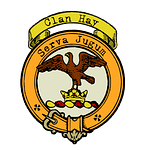Welcome back to "A Clan A Day Podcast," brought to you by bagtownclans.com. I'm your host, Colin MacDonald, and today we're exploring the fascinating history of Clan Scott, one of the most powerful and influential families of the Scottish Borders. The story of the Scotts is rich in legend, battle, and nobility, making them one of Scotland's most prominent clans throughout the centuries.
Clan Scott traces its origins back to the Scoti, a race that invaded Scotland in ancient times. Their descent from Uchtredus filius Scoti, a figure who lived in the 12th century, established their Norman roots. Uchtredus had two sons: Richard, the ancestor of the mighty Scotts of Buccleuch, and Sir Michael, who founded the line of the Scotts of Balweary. Sir Michael, who passed away around 1235, was famously known as "The Wizard," a man of great learning and wisdom in his time. These two brothers played pivotal roles in the early history of Clan Scott, both swearing fealty to Edward I of England in 1296. However, Richard’s son, another Sir Michael Scott, would break with England’s rule and throw his loyalty behind Robert the Bruce, supporting Scottish independence.
This second Sir Michael fought bravely in the Battle of Durham in 1346, where he was tragically killed. His death, however, marked the rise of his sons. Robert, the eldest, inherited the Buccleuch and Murdochston estates, expanding the family's lands with the addition of Scotstoun. His younger brother, John, established the cadet branch known as the Scotts of Synton, from whom the Lords Polwarth would descend.
The power and prestige of the Scotts peaked between the mid-15th and early 17th centuries, a time when they could raise an impressive force of 600 men in battle. The Borders region, long plagued by feuding and warfare, became a proving ground for the Scotts, who often clashed with neighboring clans, particularly the powerful Douglases. It was this climate of near-constant conflict that forged the Scotts into one of the most formidable Border families. Their war cry, "A Bellendaine," echoed through the hills, summoning their warriors to Bellendean, the traditional gathering place for battle.
One of the most defining periods in the clan’s history came with the Union of the Crowns in 1603. This union, which saw Scotland and England joined under a single monarchy, brought an end to the traditional clan system in the Borders. Frontier warfare could no longer be tolerated, and the Scotts, like many other clans, had to adapt to the new political landscape. Their power and influence didn’t diminish, however—they merely evolved. In 1606, the lordship of Scott of Buccleuch was created, followed by the earldom in 1619. By this time, the Scotts had transitioned from warrior chiefs into one of the great noble families of Scotland.
One of the most fascinating episodes in the Scott family’s history is the marriage of Anne Scott, the daughter of the second Earl of Buccleuch, to James, Duke of Monmouth, the illegitimate son of King Charles II. Monmouth took the Scott name, and the couple was granted the title of Duke and Duchess of Buccleuch. Monmouth's story, however, took a dark turn when he led a failed rebellion against his uncle, King James VII, and was beheaded for treason in 1685. Yet, despite Monmouth's tragic fall, the title of Duke of Buccleuch survived, passing to their eldest son. Through this line, the Scotts would later inherit the prestigious Dukedom of Queensberry, further cementing their status among Scotland’s elite.
In addition to their noble standing, the Scotts also produced one of Scotland's most beloved literary figures, Sir Walter Scott. A descendant of the Scotts of Harden, Sir Walter Scott’s connection to the clan runs deep. His writings immortalized the history and culture of the Scottish Borders, drawing on the clan’s legendary feuds and battles for inspiration. His home, Abbotsford House, stands as a monument to his work and the Scott legacy, nestled near the River Tweed in the heart of the Borderlands.
The Scotts were not only a military power but also deeply embedded in the political and cultural spheres of Scotland. After the pacification of the Borders, many Scotts, like their neighbors, took up arms in foreign lands, fighting in the Scots Brigade in Holland. Their reputation as fierce warriors was recognized far beyond the Borders, and their involvement in the political landscape of Scotland only grew stronger as the years passed.
The Scotts’ remarkable resilience is evident in the transition from a warrior clan to a noble dynasty. The title of Duke of Buccleuch remains one of the most prestigious in Scotland, and the family’s extensive lands and art collections, including the internationally renowned Buccleuch collection, are housed in their three great estates—Drumlanrig Castle, Bowhill House, and Boughton House.
Today, the current Duke of Buccleuch, Richard Walter John Montagu Douglas Scott, upholds the family’s proud traditions. The Scott name remains a symbol of power, loyalty, and influence, as it has for nearly a thousand years.
Thank you for joining us on this episode of "A Clan A Day Podcast." Be sure to tune in tomorrow as we uncover the history of another great Scottish clan. I'm Colin MacDonald, and as always, go n-éirí an bóthar leat.











